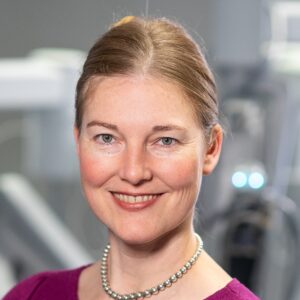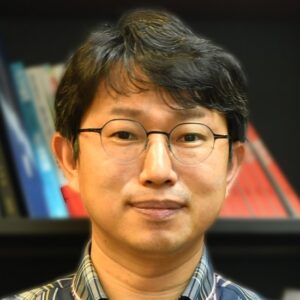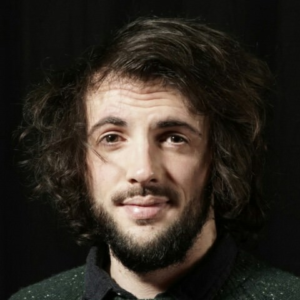Workshop at IEEE World Haptics Conference
July 8th, 2025 in Suwon (South Korea)
Abstract
As computing shifts from desktops to embedded systems, haptic feedback is likewise evolving toward wearable devices that enable whole-body interactions. Advances in VR/AR further drive demand for untethered haptics that do not impede vision or hearing. However, engineering wearable haptics poses unique challenges such as delivering stimuli across anatomical regions of varying sensitivity, miniaturizing actuators, and managing trade-offs between bandwidth, resolution, and power density. Emerging solutions include soft polymers, smart materials, pneumatics, fluidics, and compliant mechanisms that better match the biomechanics of skin and overcome the limits of conventional electromagnetic actuators. Embedding these actuators into garments requires a human-centered design ensuring conformability, adjustability, and user acceptance across diverse body shapes. Equally important is integrating touch with vision and sound to craft immersive multimodal experiences, mediate emotion, and explore perceptual illusions. This workshop will gather researchers from multidisciplinary fields to discuss the latest breakthroughs and emerging challenges in wearable haptics.
Tentative program
All times are provided in the local time zone (UTC+9).
-
08h50 - 09h00
Welcome and Introduction
-
09h00 - 09h30
Two Challenges: Consistent Body Mounting and Expressive Haptic Actuation
Katherine J. Kuchenbecker (Max Planck Institute for Intelligent Systems)
-
09h30 - 10h00
Design and Control of Multimodal Haptic Arrays in Wearable Devices for XR
Heather Culbertson (University of Southern California)
-
10h00 - 10h30
Electroosmotics for Wearable Haptics
Craig Shultz (University of Illinois Urbana-Champaign)
-
10h30 - 11h00
Coffee break
-
11h00 - 11h30
Stretchable Functional Polymer-Based Programmable Heating and Morphable Tactile Display
Ki-Uk Kyung (KAIST)
-
11h30 - 12h00
Wearable Haptics and Robotic Superlimbs to Assist Navigation and Posture
Ildar Farkhatdinov (King’s College London)
-
12h00 - 12h30
Hearing Social Touch: the Perspectives Opened by Skin-on-Skin Sonification Technologies
Malika Auvray (CNRS, Sorbonne University)
-
12h30 - 14h00
Lunch break
-
14h00 - 14h30
Beyond the Fingertips: Wrist-Worn Haptics for Immersive Interaction
Elyse D. Z. Chase (Rice University)
-
14h30 - 15h00
Salient and Versatile Full-Fingertip Haptic Feedback
Alona Shagan (Max Planck Institute for Intelligent Systems)
-
15h00 - 15h30
FiberPumps to Power Wearable Haptics
Herbert Shea (EPFL)
-
15h30 - 16h00
Coffee break
-
16h00 - 16h30
Wearable Finger Haptics for Human-Centered Robotics and Immersive Interaction
Claudio Pacchierotti (CNRS, IRISA Rennes)
-
16h30 - 17h00
Dielectric Elastomer Actuators for Wearable Haptics
Jung-Hwan Youn (University of Illinois Urbana-Champaign)
-
17h00 - 17h30
Discussion and Conclusion
Speakers

Katherine J. Kuchenbecker (Max Planck Institute for Intelligent Systems)
Katherine J. Kuchenbecker is a Director at the Max Planck Institute for Intelligent Systems (MPI-IS) in Stuttgart, Germany, and an Honorary Professor at the University of Stuttgart. She earned her Ph.D. in Mechanical Engineering with Günter Niemeyer at Stanford University in 2006, did postdoctoral research with Allison M. Okamura at the Johns Hopkins University, and was an engineering professor in the GRASP Lab at the University of Pennsylvania from 2007 to 2016. Her research blends haptics, teleoperation, physical human-robot interaction, tactile sensing, and medical applications. She delivered a TEDYouth talk on haptics in 2012 and has been honored with a 2009 NSF CAREER Award, the 2012 IEEE RAS Academic Early Career Award, a 2014 Penn Lindback Award for Distinguished Teaching, elevation to IEEE Fellow in 2021, and 19 best paper, poster, demonstration, and reviewer awards. 18 of the postdocs and doctoral students she has mentored have become faculty members around the world. She co-chaired the IEEE Haptics Symposium in 2016 and 2018 and is Editor-in-Chief of the 2025 IEEE World Haptics Conference.

Heather Culbertson (University of Southern California)
Heather Culbertson is a Gabilan Assistant Professor and Assistant Professor of Computer Science, Aerospace and Mechanical Engineering, and Biomedical Engineering at the University of Southern California. Her research focuses on the design and control of haptic devices and rendering systems, human-robot interaction, and virtual reality. Particularly she is interested in creating haptic interactions that are natural and realistically mimic the touch sensations experienced during interactions with the physical world. Previously, she was a research scientist in the Department of Mechanical Engineering at Stanford University. She received her PhD in the Department of Mechanical Engineering and Applied Mechanics at the University of Pennsylvania in 2015. She is currently serving as General Co-Chair for IEEE Haptics Symposium. Her awards include the NSF CAREER Award, IEEE Technical Committee on Haptics Early Career Award, MassRobotics Rising Star in Robotics Award, and Ershaghi Faculty Mentorship Award.

Craig Shultz (University of Illinois)
Craig is an Assistant Professor of Electrical and Computer Engineering at the University of Illinois College of Engineering and co-founder of Fluid Reality. He specializes in interactive embedded systems and haptic actuation. His work has won 6 best paper awards and nominations at premiere ACM and IEEE venues and has been featured in venues such as NBC Nightly News with Lester Holt, TechCrunch, and Engadget. Before UIUC and Fluid Reality, Craig finished his post-doc at the Future Interfaces Group at the Human-Computer Interaction Institute, and was the VP of Research and Development at Tanvas, where he developed novel electroadhesive touchscreens based on his work in surface haptics at Northwestern University's Center for Robotics and Biosystems.

Elyse D. Z. Chase (Rice University)
Elyse is an IC Postdoctoral Fellow and Rice Academy Fellow working with Dr. Marcia O’Malley as part of the MAHI Lab at Rice University. She received her M.S. and Ph.D. in Mechanical Engineering from Stanford University. Her work addresses how humans use their senses to explore and learn about the world. She builds new haptic technology and runs psychophysical experiments in virtual and augmented environments that explore how humans perceive events and interactions, focusing on multisensory integration and sensory illusions.

Claudio Pacchierotti (CNRS, IRISA Rennes)
Claudio Pacchierotti received the Ph.D. degree from the University of Siena in 2014. He has been a tenured Researcher with CNRS-IRISA, Rennes, France, since 2016. He was previously a Post-Doctoral Researcher with Italian Institute of Technology, Genoa, Italy. He was a Visiting Researcher with the Penn Haptics Group, University of Pennsylvania, in 2014, the Department of Innovation in Mechanics and Management, University of Padua, in 2013, the Institute for Biomedical Technology and Technical Medicine (MIRA), University of Twente, in 2014, and the Department of Computer, Control and Management Engineering, Sapienza University of Rome, in 2022. He received the 2014 EuroHaptics Best Ph.D. Thesis Award and the 2022 CNRS Bronze Medal. He was Chair of the IEEE Technical Committee on Haptics between 2018 and 2021, and he is currently Co-Chair of the IEEE Technical Committee on Telerobotics and Secretary of the Eurohaptics Society.

Malika Auvray (CNRS, Sorbonne University)
Malika Auvray is a CNRS director of research at the Institute of Intelligent Systems and Robotics (ISIR, Sorbonne-University). Using methodologies from cognitive sciences, her research investigates how our multisensory experiences shape our perception of the world and of the self. Her ongoing research projects aim at understanding: 1) The extent to which perceptual functions in a given sensory modality can be enriched or compensated by information provided via another sensory modality. The current line of research involves the conversion of social touch into sounds. 2) How technologies such as multisensory interfaces, rehabilitation devices, and tactile interfaces modify our perception of the world. 3) The links between spatial and social perspective taking. She published more than 50 journal articles and contributed to more than 140 communications in conference and workshops on the topic.

Ki-Uk Kyung (KAIST)
Dr. Ki-Uk Kyung received BS, MS, and Ph.D. degrees in mechanical engineering from the Korea Advanced Institute of Science and Technology (KAIST) in 1999, 2001, and 2006, respectively. In 2006, he joined the Electronics and Telecommunications Research Institute and had been the Director of the Smart UI/UX Device Research Section. He had been a co-chair of the IEEE Technical Committee on Haptics (TCH) from 2018 to 2021. He received the IEEE TCH Early Career Award in 2015 and the Academic Career Award at Active Materials and Soft Mechatronics 2019. He is currently an associate professor of Mechanical Engineering and the director of the Human-Robot Interaction Research Center at KAIST. His research interests are soft sensors and actuators, haptics, soft robots, and human-robot interaction.

Alona Shagan (Max Planck Institute for Intelligent Systems)
Alona is a postdoctoral researcher in Robotic Materials Department at the Max Planck Institute for Intelligent Systems. Her research interests include materials innovation and fabrication methods for soft robotic applications in healthcare. Alona received her Ph.D. in 2020 from the Technion - Israel Institute of Technology, where she focused on smart biocompatible polymers for biomedical applications.

Herbert Shea (EPFL)
Herb Shea is a professor of mechanical engineering at the Ecole Polytechnique Fédérale de Lausanne (EPFL) in Switzerland, where he leads the Soft Transducers Lab (EPFL-LMTS). He is currently the director of EPFL’s institute of mechanical engineering. Herb holds a PhD in physics from Harvard University (1997), after which he spent 2 years at IBM Research Yorktown and 5 years at Bell Labs, prior to moving to Switzerland. Herb and his team’s research is centered on electrically-driven elastomer-based compliant actuators for wearables, haptics and soft robotics.

Ildar Farkhatdinov (King’s College London)
Dr. Ildar Farkhatdinov is an Associate Professor (Senior Lecturer) in Medical Robotics at the School of Biomedical Engineering and Imaging Sciences at King's College London, United Kingdom. He is a recognized expert in assistive robotics and human-machine interaction, with applications in rehabilitation, neuroscience, and immersive environments. Prior to joining King's, he held an academic position at Queen Mary University of London (2016–2024) and was a postdoctoral research associate in the Human Robotics group at the Department of Bioengineering, Imperial College London (2013–2016). He earned his Ph.D. in Robotics from Sorbonne University (UPMC, France) in 2013, his M.Sc. in Mechanical Engineering from KoreaTech University in 2008, and his B.Sc. in Automation and Control from Moscow University STANKIN in 2006. Dr Farkhatdinov is also a co-founder of Human Robotix Ltd, a London-based start-up developing novel robotic technologies for research on the human sensorimotor system.

Jung-Hwan Youn (University of Illinois Urbana-Champaign)
Jung-Hwan is a postdoctoral researcher in Electrical & Computer Engineering at the University of Illinois Urbana-Champaign. Before joining, he worked as a postdoctoral researcher at the Electronics and Telecommunications Research Institute (ETRI), a national research lab in Korea. He received his Ph.D. in 2023 from the Korea Advanced Institute of Science and Technology (KAIST), advised by Professor Ki-Uk Kyung. His research interests include haptics, soft robotics, and human-robot interaction.
Speakers

Katherine J. Kuchenbecker (Max Planck Institute for Intelligent Systems)
Katherine J. Kuchenbecker is a Director at the Max Planck Institute for Intelligent Systems (MPI-IS) in Stuttgart, Germany, and an Honorary Professor at the University of Stuttgart. She earned her Ph.D. in Mechanical Engineering with Günter Niemeyer at Stanford University in 2006, did postdoctoral research with Allison M. Okamura at the Johns Hopkins University, and was an engineering professor in the GRASP Lab at the University of Pennsylvania from 2007 to 2016. Her research blends haptics, teleoperation, physical human-robot interaction, tactile sensing, and medical applications. She delivered a TEDYouth talk on haptics in 2012 and has been honored with a 2009 NSF CAREER Award, the 2012 IEEE RAS Academic Early Career Award, a 2014 Penn Lindback Award for Distinguished Teaching, elevation to IEEE Fellow in 2021, and 19 best paper, poster, demonstration, and reviewer awards. 18 of the postdocs and doctoral students she has mentored have become faculty members around the world. She co-chaired the IEEE Haptics Symposium in 2016 and 2018 and is Editor-in-Chief of the 2025 IEEE World Haptics Conference.

Heather Culbertson (University of Southern California)
Heather Culbertson is a Gabilan Assistant Professor and Assistant Professor of Computer Science, Aerospace and Mechanical Engineering, and Biomedical Engineering at the University of Southern California. Her research focuses on the design and control of haptic devices and rendering systems, human-robot interaction, and virtual reality. Particularly she is interested in creating haptic interactions that are natural and realistically mimic the touch sensations experienced during interactions with the physical world. Previously, she was a research scientist in the Department of Mechanical Engineering at Stanford University. She received her PhD in the Department of Mechanical Engineering and Applied Mechanics at the University of Pennsylvania in 2015. She is currently serving as General Co-Chair for IEEE Haptics Symposium. Her awards include the NSF CAREER Award, IEEE Technical Committee on Haptics Early Career Award, MassRobotics Rising Star in Robotics Award, and Ershaghi Faculty Mentorship Award.

Craig Shultz (University of Illinois)
Craig is an Assistant Professor of Electrical and Computer Engineering at the University of Illinois College of Engineering and co-founder of Fluid Reality. He specializes in interactive embedded systems and haptic actuation. His work has won 6 best paper awards and nominations at premiere ACM and IEEE venues and has been featured in venues such as NBC Nightly News with Lester Holt, TechCrunch, and Engadget. Before UIUC and Fluid Reality, Craig finished his post-doc at the Future Interfaces Group at the Human-Computer Interaction Institute, and was the VP of Research and Development at Tanvas, where he developed novel electroadhesive touchscreens based on his work in surface haptics at Northwestern University's Center for Robotics and Biosystems.

Elyse D. Z. Chase (Rice University)
Elyse is an IC Postdoctoral Fellow and Rice Academy Fellow working with Dr. Marcia O’Malley as part of the MAHI Lab at Rice University. She received her M.S. and Ph.D. in Mechanical Engineering from Stanford University. Her work addresses how humans use their senses to explore and learn about the world. She builds new haptic technology and runs psychophysical experiments in virtual and augmented environments that explore how humans perceive events and interactions, focusing on multisensory integration and sensory illusions.

Claudio Pacchierotti (CNRS, IRISA Rennes)
Claudio Pacchierotti received the Ph.D. degree from the University of Siena in 2014. He has been a tenured Researcher with CNRS-IRISA, Rennes, France, since 2016. He was previously a Post-Doctoral Researcher with Italian Institute of Technology, Genoa, Italy. He was a Visiting Researcher with the Penn Haptics Group, University of Pennsylvania, in 2014, the Department of Innovation in Mechanics and Management, University of Padua, in 2013, the Institute for Biomedical Technology and Technical Medicine (MIRA), University of Twente, in 2014, and the Department of Computer, Control and Management Engineering, Sapienza University of Rome, in 2022. He received the 2014 EuroHaptics Best Ph.D. Thesis Award and the 2022 CNRS Bronze Medal. He was Chair of the IEEE Technical Committee on Haptics between 2018 and 2021, and he is currently Co-Chair of the IEEE Technical Committee on Telerobotics and Secretary of the Eurohaptics Society.

Malika Auvray (CNRS, Sorbonne University)
Malika Auvray is a CNRS director of research at the Institute of Intelligent Systems and Robotics (ISIR, Sorbonne-University). Using methodologies from cognitive sciences, her research investigates how our multisensory experiences shape our perception of the world and of the self. Her ongoing research projects aim at understanding: 1) The extent to which perceptual functions in a given sensory modality can be enriched or compensated by information provided via another sensory modality. The current line of research involves the conversion of social touch into sounds. 2) How technologies such as multisensory interfaces, rehabilitation devices, and tactile interfaces modify our perception of the world. 3) The links between spatial and social perspective taking. She published more than 50 journal articles and contributed to more than 140 communications in conference and workshops on the topic.

Ki-Uk Kyung (KAIST)
Dr. Ki-Uk Kyung received BS, MS, and Ph.D. degrees in mechanical engineering from the Korea Advanced Institute of Science and Technology (KAIST) in 1999, 2001, and 2006, respectively. In 2006, he joined the Electronics and Telecommunications Research Institute and had been the Director of the Smart UI/UX Device Research Section. He had been a co-chair of the IEEE Technical Committee on Haptics (TCH) from 2018 to 2021. He received the IEEE TCH Early Career Award in 2015 and the Academic Career Award at Active Materials and Soft Mechatronics 2019. He is currently an associate professor of Mechanical Engineering and the director of the Human-Robot Interaction Research Center at KAIST. His research interests are soft sensors and actuators, haptics, soft robots, and human-robot interaction.

Alona Shagan (Max Planck Institute for Intelligent Systems)
Alona is a postdoctoral researcher in Robotic Materials Department at the Max Planck Institute for Intelligent Systems. Her research interests include materials innovation and fabrication methods for soft robotic applications in healthcare. Alona received her Ph.D. in 2020 from the Technion - Israel Institute of Technology, where she focused on smart biocompatible polymers for biomedical applications.

Herbert Shea (EPFL)
Herb Shea is a professor of mechanical engineering at the Ecole Polytechnique Fédérale de Lausanne (EPFL) in Switzerland, where he leads the Soft Transducers Lab (EPFL-LMTS). He is currently the director of EPFL’s institute of mechanical engineering. Herb holds a PhD in physics from Harvard University (1997), after which he spent 2 years at IBM Research Yorktown and 5 years at Bell Labs, prior to moving to Switzerland. Herb and his team’s research is centered on electrically-driven elastomer-based compliant actuators for wearables, haptics and soft robotics.

Ildar Farkhatdinov (King’s College London)
Dr. Ildar Farkhatdinov is an Associate Professor (Senior Lecturer) in Medical Robotics at the School of Biomedical Engineering and Imaging Sciences at King's College London, United Kingdom. He is a recognized expert in assistive robotics and human-machine interaction, with applications in rehabilitation, neuroscience, and immersive environments. Prior to joining King's, he held an academic position at Queen Mary University of London (2016–2024) and was a postdoctoral research associate in the Human Robotics group at the Department of Bioengineering, Imperial College London (2013–2016). He earned his Ph.D. in Robotics from Sorbonne University (UPMC, France) in 2013, his M.Sc. in Mechanical Engineering from KoreaTech University in 2008, and his B.Sc. in Automation and Control from Moscow University STANKIN in 2006. Dr Farkhatdinov is also a co-founder of Human Robotix Ltd, a London-based start-up developing novel robotic technologies for research on the human sensorimotor system.

Jung-Hwan Youn (University of Illinois Urbana-Champaign)
Jung-Hwan is a postdoctoral researcher in Electrical & Computer Engineering at the University of Illinois Urbana-Champaign. Before joining, he worked as a postdoctoral researcher at the Electronics and Telecommunications Research Institute (ETRI), a national research lab in Korea. He received his Ph.D. in 2023 from the Korea Advanced Institute of Science and Technology (KAIST), advised by Professor Ki-Uk Kyung. His research interests include haptics, soft robotics, and human-robot interaction.
Organizers

Thomas Daunizeau (EPFL)
Thomas Daunizeau is a postdoctoral researcher in the Soft Transducers Laboratory (LMTS) at EPFL. He earned his Ph.D. from Sorbonne University in 2023, where his dissertation received the EuroHaptics Best Ph.D. Thesis Award, the GDR Robotique Prize, and the Prix de la Chancellerie. In 2021, he held a Fulbright Fellowship at Stanford University, conducting research on soft robotics. Prior to his doctoral studies, he worked as a research engineer on the teleoperation of microrobotic systems. His research interests include soft tactile sensors, metamaterials, and biophysics, focusing on their applications in studying the sense of touch in both humans and robots.

Giulio Grasso (Max Planck Institute for Intelligent Systems)
Dr. Giulio Grasso is a postdoctoral researcher at the Biomimetic Materials and Machines group of the Max Planck Institute for Intelligent Systems, led by Dr. Florian Hartmann. He obtained both B.Sc. (2016) and M.Sc. (2019) in Mechanical Engineering from Politecnico di Bari (Italy). He then joined the Soft Transducers Laboratory of EPFL (Switzerland) as a research assistant and doctoral student under the supervision of Prof. Herbert Shea and Dr. Samuel Rosset (University of Auckland, New Zealand). Here, Giulio developed additive manufacturing processes for zipping electrostatic actuators for on-skin haptic feedback applications, and gained expertise in soft MEMS fabrication processes, design of electrostatic actuators, and both analytical and FEM-based modelling. He obtained the title of Doctor of Science in 2024. In his current research position, Giulio continues exploring innovative fabrication processes and modelling approaches for soft compliant systems.
Organizers

Thomas Daunizeau (EPFL)
Thomas Daunizeau is a postdoctoral researcher in the Soft Transducers Laboratory (LMTS) at EPFL. He earned his Ph.D. from Sorbonne University in 2023, where his dissertation received the EuroHaptics Best Ph.D. Thesis Award, the GDR Robotique Prize, and the Prix de la Chancellerie. In 2021, he held a Fulbright Fellowship at Stanford University, conducting research on soft robotics. Prior to his doctoral studies, he worked as a research engineer on the teleoperation of microrobotic systems. His research interests include soft tactile sensors, metamaterials, and biophysics, focusing on their applications in studying the sense of touch in both humans and robots.

Giulio Grasso (Max Planck Institute for Intelligent Systems)
Dr. Giulio Grasso is a postdoctoral researcher at the Biomimetic Materials and Machines group of the Max Planck Institute for Intelligent Systems, led by Dr. Florian Hartmann. He obtained both B.Sc. (2016) and M.Sc. (2019) in Mechanical Engineering from Politecnico di Bari (Italy). He then joined the Soft Transducers Laboratory of EPFL (Switzerland) as a research assistant and doctoral student under the supervision of Prof. Herbert Shea and Dr. Samuel Rosset (University of Auckland, New Zealand). Here, Giulio developed additive manufacturing processes for zipping electrostatic actuators for on-skin haptic feedback applications, and gained expertise in soft MEMS fabrication processes, design of electrostatic actuators, and both analytical and FEM-based modelling. He obtained the title of Doctor of Science in 2024. In his current research position, Giulio continues exploring innovative fabrication processes and modelling approaches for soft compliant systems.
Venue
The workshop will be held at the Suwon Convention Center (SCC).
140 Gwanggyojungang-ro,
Yeongtong-gu,
Suwon-si,
Gyeonggi-do, 16514,
Republic of Korea
© 2025 Thomas Daunizeau. All Rights Reserved.
Website compliant with Americans with Disabilities Act (ADA) and Web Content Accessibility Guidelines (WCAG).